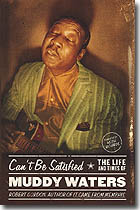 This
is one of the most satisfying music biographies I’ve read. Equal to the
subject at hand, Gordon chronicles Waters, arguably the most important
figure in blues, with the style, wit and articulation of a master
storyteller. From the origins of the name (“Muddy” was given him by his
grandmother in reaction to her fear that the Mississippi would carry him
away if he continued to play near its banks) to his childhood on Stovall
Plantation and 1941 discovery by Alan Lomax through his death in 1983,
this is exhaustive without succumbing to litany. The tone is warm, and the
man is portrayed as flesh and blood. Gordon is not sparing in his
description of Muddy as a sometimes self-absorbed womanizer.
This
is one of the most satisfying music biographies I’ve read. Equal to the
subject at hand, Gordon chronicles Waters, arguably the most important
figure in blues, with the style, wit and articulation of a master
storyteller. From the origins of the name (“Muddy” was given him by his
grandmother in reaction to her fear that the Mississippi would carry him
away if he continued to play near its banks) to his childhood on Stovall
Plantation and 1941 discovery by Alan Lomax through his death in 1983,
this is exhaustive without succumbing to litany. The tone is warm, and the
man is portrayed as flesh and blood. Gordon is not sparing in his
description of Muddy as a sometimes self-absorbed womanizer.
Landmark events are discussed in detail, from his
first recording (“I Be’s Troubled” and “Country Blues”), to meeting his
lifelong friend Jimmy Rogers shortly after moving to Chicago in 1943 and
ultimately changing the face of the music. His early mutually advantageous
association with Leonard and Phil Chess is discussed, as are the bands ---
from the classic Little Walter, Otis Spann, Jimmy Rogers, Elga Edmonds
lineup to a succession of others that included Junior Wells, James Cotton,
Pat Hare, Francis Clay, Willie Smith, Mojo Buford, Sammy Lawhorn, Paul
Oscher, Luther Johnson, Pinetop Perkins, Hollywood Fats, Pee Wee Madison,
Calvin Jones, Bob Margolin, Jerry Portnoy and others.
Gordon writes of Muddy telling the Chess brothers
that they’d better record Chuck Berry’s “Maybelline.” Chris Barber is said
to have credited the MJQ’s staid John Lewis with telling him that they’d
better get Muddy to tour England. His ignorance of music outside of his
own realm was pointed out in the story about Muddy introducing his guest
to an audience as John Dylan.
In 1960 he played Newport, was nominated for his
first Grammy (he’d wait a decade to collect his first), and nearly died in
an auto accident.
He would later play for President Carter at the
White House, Eric Clapton and Johnny Winter were at his 1979 wedding, and
he was inducted into the Blues Foundation’s Blues Hall of Fame in 1981,
their first year. Before the year passed, he was diagnosed with cancer.
Two years later he was dead.
Muddy Waters was royalty. Robert Gordon reminds the
reader that he was a mortal man, too. The Muddy Waters that emerges from
this riveting read is revealed to be a man who was taken advantage of as
frequently as he did so to others. None of which detracts, of course, from
the music. Highly recommended.
--- Mark E. Gallo


![]()